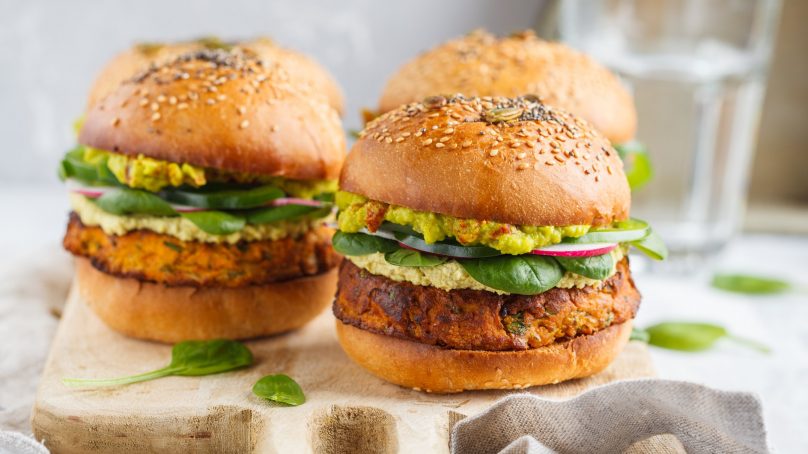There are a greater number of meat substitutes on the market than ever before. We asked three chefs to tell us about their preferred vegan and plant-based options and how they are keeping their clients satisfied.



YOUSSEF AKIKI
Managing partner of Kitchen Backstage & Executive Chef – brût restaurant Kitchen Backstage
How are you keeping up with consumer demand for plant-based meat substitutes?
Interest in veganism and plant-based foods is on the rise and showing no signs of slowing down. It is more than a trend — it is a lifestyle choice that’s mainly based on health. More research is showing the good sides of being vegan. It’s been almost a year since I added vegan dishes on my menu.
How does cooking with meat substitutes differ from cooking with real meat?
Meat substitutes are designed to imitate real meat in terms of taste and texture. Burgers and patties based on grains are high in carbohydrates and thus may be used as a substitute for both meat and side dishes like rice or pasta in a traditional meal.
One major characteristic of high moisture meat substitutes is their fibrous structure, which gives the products a meat-like appearance. By variation of the process conditions, it is possible to generate products with the appearance of whole muscle meat that resembles chicken or beef, for example.
What are the main meat substitutes and which do you normally use in your kitchen?
Jackfruit, seitan, tofu or tempeh-based meat are common substitutes. However, I tend to use more natural, non-modified ingredients based on vegetables, such as eggplant, Portobello mushroom or grains like beans, soybeans and lentils.
Which meat and meat substitute brands do you recommend?
U.S. Prime Meat is a great brand. I do not use meat substitute brands, but I know that Beyond Meat has a wide selection of products.

STUART DUFF
Corporate chef UK&I of Hilton Hotels and Resorts
How are you keeping up with consumer demand for plant-based meat substitutes?
At Hilton Hotels UK&I, at least 30 percent of all of the menus — including conference and banqueting — feature plant-based appetizers, main dishes and desserts. I engage with our key suppliers, and the plant-based trend has been growing for couple of years now. I always try to find products that are interesting and not just the run-of-the-mill items like tofu and soya.
How do you satisfy customers who follow vegan, vegetarian or plant based diets?
At Hilton, there are the dishes we have that are plant and grain based, such as our vegan chili with ancient grains or our avocado club triple-deck sandwich. However, we do serve meat substitute dishes. Moving Mountains’ plant-based burger has the profile and taste of meat but is 100 percent plant based, which really appeals to the flexitarian market. It is served on a brioche-style vegan bun with vegan mayonnaise. Furthermore, we offer a vegan chocolate and passion fruit tart with vegan vanilla ice cream.
How does cooking with meat substitutes differ from cooking with real meat?
Meat substitutes cook very quickly compared to meat products. It is important to cook meat substitutes in separate pans and trays to avoid cross contamination.
What are the main meat substitutes and which do you normally use in your kitchen?
The meat substitutes I use at Hilton are tempeh, jackfruit and tofu. We have a supplier called Vegetarian Express, and they keep us informed on what’s available in the market. I’m not a fan of jackfruit personally, but we serve it pulled in our firecracker tacos and it’s a popular item.
Which meat and meat substitute brands do you recommend?
At Hilton, we use Moving Mountains’ sausages and burgers. I have tried all of the brands on the market and these are the best. Another great brand is Beyond Burgers. The market has evolved, and all of our suppliers have something that caters to this ever growing market.

TARA KHATTAR
Chef consultant and cookbook author
How are you keeping up with consumer demand for plant-based meat substitutes?
I think the world will continue to move toward a more plant-based diet both for our health and the health of our ecosystems. However, I am not a huge fan of plant-based meat products that look, bleed, smell and taste like meat. I believe that if you want to stay away from meats, there are plenty of natural options out there that taste just as good.
How do you satisfy customers who follow vegan, vegetarian or plant based diets?
I personally prefer to stay away from plant-based meats. I prefer to introduce my clients to vegetarian dishes that are satisfying enough for both meat eaters and vegetarians where the client doesn’t really miss the meat. I usually use beans, lentils and mushrooms to mimic the same texture and make the dish more substantial and filling.
How does cooking with meat substitutes differ from cooking with real meat?
If I were going to prepare a meat dish, I’d rather cook with real meat. I think it is important to respect products and enjoy them as they are. I tend to prefer the vegetarian version of almost all the recipes I prepare and think that vegetables have so much more to offer than we give them credit for when they are cooked properly. They are much more versatile than meats or other animal proteins; the options are endless.
What are the main meat substitutes and which do you normally use in your kitchen?
My favorite plant protein is usually tempeh or tofu. I like the way that the flavor blends with almost any seasoning. Jackfruit is a great substitute for pulled meats; it looks exactly like pulled beef.
Which meat and meat substitute brands do you recommend?
The most popular meat substitute brands are Beyond Meat and Impossible Meats.
















